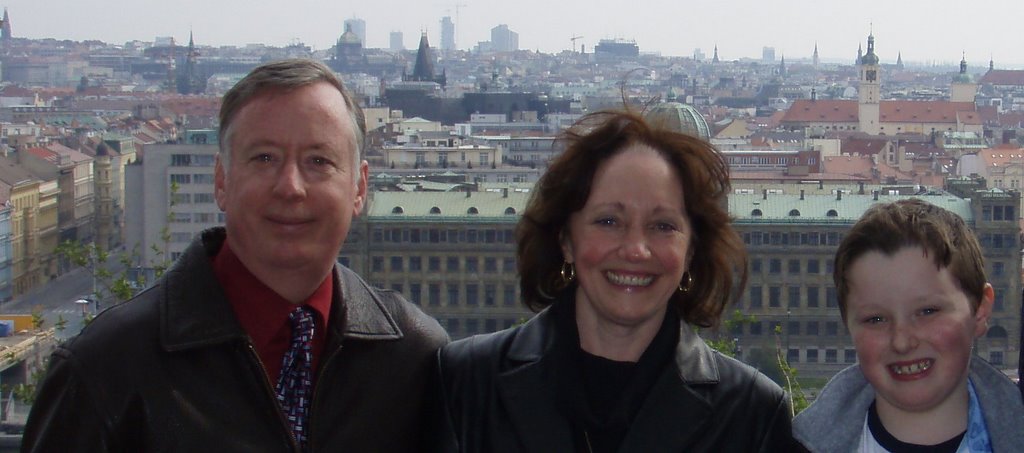
Recently, Iran has been arresting or otherwise harassing Iranian-Americans, including some who work for Radio Free Europe/Radio Liberty. One of our correspondents, Parnaz Azima, had her passport taken from her and became a virtual prisoner when she visited Iran in January to see her ailing 94 year-old mother Just yesterday she was finally allowed to leave Iran and was reunited with family, friends and RFE/RL colleagues today in the US.
Our president, Dr. Jeff Gedmin, has an op-ed piece in today's Washington Post.
Voices That Tehran Fears (Washington Post, September 19, 2007) by Jeffrey Gedmin
Our reporter Parnaz Azima finally made it out of Iran yesterday. Iranian
authorities, who had blocked her exit from the country since January,
returned her passport two weeks ago but then proceeded to create a series
of bureaucratic obstacles that prevented her from returning to her family
and colleagues. Azima, who has U.S. and Iranian dual citizenship, works
for Radio Farda, the Persian-language broadcast service of Radio Free
Europe/Radio Liberty, the congressionally funded broadcasters based in
Prague.
Azima is one of Iran’s best-known literary translators. She is famous for
her translations of Ernest Hemingway’s works. In January she traveled to
Tehran to visit her ailing 94-year-old mother and unwittingly became
ensnared in a larger game being played by Iran’s regime. Its aim is simple:
to intimidate dissidents at home while pressuring the United States to
refrain from supporting Iranian civil society.
Consider the way Tehran is attempting to put Radio Farda (“Farda” means
tomorrow in Persian) in a bind. The Iranian government calls Farda a
“counterrevolutionary radio station.” In fact, Farda simply provides the
Iranian people the news their government denies them. Our ratings remain
high. The regime expends considerable effort trying to jam our signals and
block access to our Web site. It’s not hard to understand why.
This summer Farda provided in-depth reporting on Iranian protests over
the regime’s gas-rationing policies. Farda relied on stringers around the
country for dozens of interviews with experts, officials and ordinary
citizens. We provided first-rate, objective analysis from economists
outside Iran. While there had been some opening in the media landscape
under reformist president Mohammad Khatami, this process of liberalization
was shut down by Mahmoud Ahmadinejad after he became president in 2005.
Today, government censors tell editors how they may cover “sensitive”
stories. One may, for example, report on Iran’s debate with the world
community over Tehran’s nuclear program. One may not, however, use the word
“bomb” or the words “United Nations Security Council.” Not surprisingly,
news-hungry Iranians turn to Farda and Voice of America for accurate news
and information.
Recently, Farda covered the arrests of members of Tehran’s bus drivers
union. Our broadcasters reported on the expulsion of Baha’i students from
Iranian universities. This summer we analyzed the crackdown on women’s
dress code violations. Last week we featured a sad, bizarre story on “dog
prisons” in Iran (clerical rulers view pet dogs as out of step with Islam);
some police officers are apparently chafing under pressure to arrest kids
walking their pets in parks. These social fissures are important. In a free
society, independent media would feel obliged to cover them.
Our broadcasters and correspondents are brave to do what they do.
Intelligence officers in Tehran interrogate and threaten family members of
Farda staffers. This summer, a young journalist working for us was
summoned by an Iranian court to return home to face charges of conducting
“activities against national security.” Authorities have threatened to take
possession of his aunt’s house (in exchange for “bail” he “owes”) should he
not appear for trial. Another colleague expressed concern to me about
activities of the Iranian Embassy in Prague. In the 1980s and early 1990s,
the Iranian regime moved hard against exiles, killing Iranian citizens in
numerous European countries. Iran’s foreign minister, when he was
ambassador to Turkey in the late 1980s, was expelled when it was
discovered that he was involved in nabbing Iranian dissidents. Such
activities, unfortunately, do not seem to have stopped; Iranian authorities
have discouraged Parnaz Azima from returning to Farda.
In this context, it can be disheartening to witness the endless bickering
in Washington over how to help Iranian civil society. It is strange to hear
the outcry from some who rail against the U.S. government’s earmark of $75
million to aid the effort. That seems a paltry sum considering the
importance and enormousness of the task at hand. Does the regime use this
modest support as a pretext to crack down on dissidents? Of course it does.
That’s what dictators do. All of us are still waiting for those flawless
and risk-free alternatives.
Our Farda team is hardly a monolith. Our roughly three dozen colleagues
include social democrats, monarchists, passionate pro-Americans and ardent
critics of the U.S. president and his policies. Our youngest employee is
23, the oldest 73. One thing unites this diverse group: the conviction that
Iran deserves a decent, accountable government and a political system far
freer and more tolerant than the current one. For some that sounds like the
dirty words “regime change.” That’s a pity. I thought we all liked “soft
power,” especially after Iraq. Many of us think this work still represents
America at its best.
The writer is president of Radio Free Europe/Radio Liberty.
Note: Jeff has been our president only since April, and in that short time has accomplished a great deal. He is a brilliant thinker and analyst, and I find him to be an extremely likable guy (and he's not above having a beer with the guys at Jama's, which counts for a lot in my book).
Wednesday, September 19, 2007
President Gedmin's Op-Ed in today's Washington Post...
Posted by
Al Tischler
at
3:44 PM
![]()
![]()
Labels: gedmin, radio free europe, rfe/rl
Subscribe to:
Post Comments (Atom)


No comments:
Post a Comment